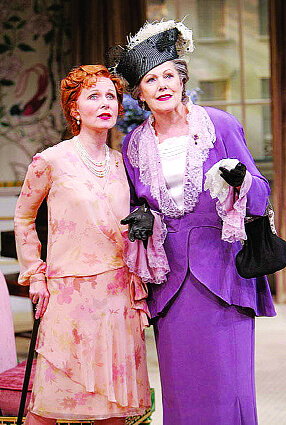Celia Imrie a smash only through July 3; bye-bye Beekman; Glen liveth
Lynn Redgrave delivered a very personal tour-de-force in a matinee performance on June 23 of her own play “Nightingale”—squeezed in among her regular schedule in “The Constant Wife”—at the National Arts Club, as part of the wonderful Food For Thought lunch hour series masterminded by Susan Charlotte.
Amidst what she termed an “apocalyptic” moment in life in 1999—when she discovered that her husband John Clark had fathered a child by his personal assistant, who then went on to marry their son Ben—Redgrave was exiled at the Chiswick home of her sister Vanessa, where they had both grown up. Lynn wandered into the local cemetery, looking for the grave of her maternal grandmother, whom she remembered as a cold, unloving woman. That cemetery visit led her to imagine what her grandmother’s life was like and the result of her meditation is an hour-long piece of remarkably original theater, marked by richly percipient writing and masterly performance skill. Redgrave makes you understand the tricks life can play and how a bright, eager little girl, kept in Victorian ignorance about sex and other realities, could be transformed into an icy monster jealous of the professional and personal success of her own daughter, Lynn and Vanessa’s mother Rachel Kempson. Vanessa, herself in New York for the 10-day run of “Hecuba” at BAM, who had never seen this play, was on hand at the National Arts Club, throwing those huge hands into the air with applause at the end. The sisters shared heartfelt sentiments before the packed house.
That same night, I caught Lynn in the Roundabout’s W. Somerset Maugham’s “The Constant Wife,” in which she stole the show as the redoubtable Mrs. Culver, investing one word, “fertilized,” with a hilarity that brought down the house.
Another British actor’s actor, Celia Imrie, is making her official American debut in gay playwright Stewart Permutt’s “Unsuspecting Susan,” seen on June 22, part of the wonderful Brits Off Broadway Festival at 59 E. 59 Theatres (212- 279-4200). Imrie plays the veddy proper Hampshire mother of a troubled son, whose veneered life is suddenly mucked up by some headline-making news. In this solo turn, Imrie commands the stage with a deeply poignant authority and crisp comic timing which you must catch before it ends July 3.
I saw Imrie as Lady Candour in London in a fabulous 1998 Royal Shakespeare production of “School for Scandal” and have been in thrall to her talent ever since. Although largely unknown here, her witty face and manner should be familiar from the “Bridget Jones” films, as well as “Star Wars: Episode 1: The Phantom Menace.” She showed up for our interview in a magnificent sequined tunic by Jenny Packham, a hot Brit designer, who gave her five gowns to swan about in, as well as wear on the QE2, which this diva is taking back to London.
Gay audiences love her for her role as Claudia Bing, p.r. rival to Jennifer Saunders on “Absolutely Fabulous,” which Imrie loved doing.
“Jennifer’s amazing,” she said, “so talented. She would literally write scenes the night before shooting. And it was so much fun, because of course her character was a huge Christian Lacroix fan and I got to outshine her in a Lacroix that cost £1,000. Naomi Campbell was charming to work with, showed up on time, but no energy. You couldn’t hear her.”
Imrie initially turned down “Unsuspecting Susan,” fearing the responsibility of a one-woman show, but is now over the moon with it, and adoring of her entire creative team, especially Permutt, whom she likens to Alan Bennett. After years of being an ensemble actress, I asked her if she finally felt like a star now and she said, “I don’t think I am a star. I have quite a way to go. But for some reason I don’t mind that. When I first played a supporting role to Dame Judi Dench, whom I absolutely adore, it was a good 12 years ago. That’s actually quite a nice position to be in, but I mustn’t be afraid to take on the challenge of a Cleopatra or ‘Virginia Woolf,’ as some have suggested I do.”
In the Dench play, “The Sea,” Imrie had to play a downtrodden companion to a grand dame and wore an old gray cardigan: “It was dowdy, horrible, but perfect for the character, and Judi said, ‘I don’t know why you’re thinking of playing all these glamorous parts. They don’t suit you at all. Gray cardigan parts for you from now on!’ And when I finally went to the RSC with “School for Scandal,” a parcel arrived for me the first night from her, and inside was an old gray cardigan! And it goes on and on and on. She loves it when I have to play an old gray cardigan part, which I have to do quite often. She would loathe it if she saw me in something like this Jenny Packham!”
Imrie took the part of a fighter pilot in “Star Wars,” “because I have a little boy I am raising myself, and thought it would be very good street cred for his Mum. I was in an airplane on a blue screen and didn’t know where I fit into the story because they were so worried about it getting out. I wore an incredible Tricia Biggar costume but, as I was the only woman, I wore lipstick, and got told off for it by a message passed down to me from George Lucas.”
Like many, Imrie wondered why a Brit wasn’t cast as Bridget Jones, but Renee Zellweger’s charm and talent won her over.
“She actually convinced me that she knew all about my career. Who knows if she really did?” she recalled. “But her accent was flawless. I don’t think a British actress could have made a similar transformation.”
As for Zellweger’s notorious weight loss, Imrie said, “I was in a lunatic asylum for starving myself to death, so know all about that. But she’s so thin now, I went to hug her at a party and was afraid she’d snap in two. It’s none of my business, but I’m afraid for her and I thought she looked so sexy with the weight on as Bridget
As for cosmetic surgery, Imrie has made a pact with her friend, actress Geraldine James, not to have anything done.
Imrie just finished a film, “Nanny McPhee,” starring and written by Emma Thompson.
“It’s based on the children’s books, a charming cross between ‘Mary Poppins’ and ‘The Sound of Music,’” she said. “I play this gross woman trying to marry Colin Firth, a widower with six impossible children. During filming, he fell on top of me and gave me a black eye with his chiseled jaw and we laughed about that. Angela Lansbury, my heroine, is in it. Amazing woman, gorgeous, so elegant and very tall.”
At one of producer Brian Bantry’s screenings, I caught “Bewitched.” The film—apart from a too-strenuous Will Ferrell, who once again proves that character comics do not a leading man make—is amusing enough, with Nicole Kidman wittily channeling Marilyn Monroe, but it all paled into insignificance with Bantry’s poignant announcement that this would be the final screening at the beloved Beekman Theatre. It is to be torn down to make way for the Memorial Sloan-Kettering Cancer Center, another uniquely Manhattan landmark disappearing before our eyes. Immortalized in “Annie Hall” and opened in 1952, the Art Moderne 510-seat theater always provided the maximum pleasure for any moviegoer, like walking into a streamlined, comforting womb with immaculate sightlines.
“I don’t know about you, Glen Campbell,” Composer Jimmy Webb said at their shared gig, at Feinstein’s at the Regency on June 17, “as singers get older, they lose their high notes, but your range just gets stronger and higher.”
Truer words were never spoken, for the 69-year-old singer, still hale and apple-cheeked after all these years, crooned what he himself termed those “rangy” Webb classics with jaw-dropping force and purity
Campbell modestly said, after killing with his double Grammy-winning standard-of-standards, “By the Time I Get to Phoenix,” “I think that’s my favorite song.” He and Webb jokingly reminisced about the late John Denver (“a sweet man, but you did not want to leave him alone with a bottle of Jack Daniels and a chainsaw’) and Campbell’s 1960s CBS show, “Glen Campbell’s Goodtime Hour.” Campbell recalled getting the song, “Galveston,” from Don Ho, of all people, who was a guest on his show. Campbell said the song had never worked for Ho, because he sang it in the Dean Martin-on-downers, funereally paced fashion that became his signature style, after which he gave it a rousing reading that had the whole house humming.
It was a particularly genial, folksy 11 p.m. set—pure country, pure music—sparked by Campbell’s guitar dexterity, attended by an enthusiastic crowd somewhat less soignée than the usual Feinstein’s bunch. They included a pair of front row gay gents who unfortunately proved to be something of a late night liability. A front-row daddy bear and cub couple, who had been punishing the Glenlivet and somehow forgot they weren’t in their own living room, repeatedly interrupted Campbell’s onstage repartee and—God help us—cuddled like teens on a first date during “Wichita Lineman.” It was indeed a testament to either Campbell’s good ole boy tolerance or merciful performance obliviousness that such distractions didn’t faze him in the least.
Contact David Noh at Inthenoh@aol.com
gaycitynews.com




































